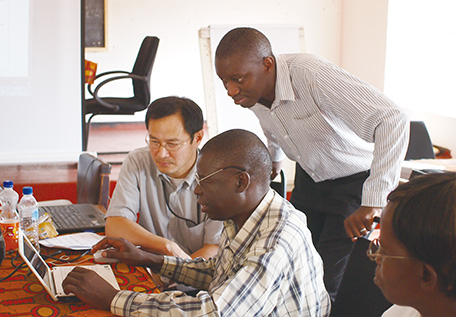Japan's Official Development Assistance White Paper 2013
Stories from the field 05
Cultivating Agricultural Products Suited to the Local Area Together with Farmers
– Training for Agriculture Extension Workers Begins in Zambia –

Mr. Sasaki creates educational materials with master trainers. (Photo: Goichi Sasaki)
In the African country of Zambia, 85% of the farming is done by small-scale farmers growing the staple crop of maize by making use of rainwater during the rainy season. However, limited funds to purchase seeds and fertilizer and a high dependence on the amount of rainfall for harvest means that productivity continues to be low.
The Zambian Ministry of Agriculture and Livestock has categorized each district into regions called “camps,” and agriculture extension workers are being sent to train each camp. However, the workers are dispatched without ever receiving sufficient training, and from that point on, neither the Ministry of Agriculture and Livestock nor the provincial governments conduct much follow-up.
It was against this backdrop that JICA received a request from the Government of Zambia and began support to improve the conditions of small-scale farmers in the country in June 2002. From December 2009, JICA began the “Rural Extension Services Capacity Advancement Project -Through PaViDIA Approach-.” One important program of this project is the training of agriculture extension workers.
Mr. Goichi Sasaki first became involved in agriculture support in Zambia from 2000 as a JOCV. He is currently an agricultural expert assigned to the above project, and he is working in that capacity to plan and implement training for agriculture extension workers and support the development of educational materials.
“Once recruited in the capital city, agriculture extension workers receive almost no training before being sent to rural areas, and they are left to themselves with no follow-up. Communications among the Ministry of Agriculture and Livestock, Provinces, districts, and agriculture extension workers are poor, which means that the national Government is unable to get a grasp of the reality of small-scale farmers and the workers are unable to utilize the knowledge possessed by the Ministry. To improve this country’s agricultural industry we must strengthen vertical lines of communication.”
Training began from 2012 and targeted all currently employed agriculture extension workers. The training was designed to have workers think about the best crops for their assigned regions together with farmers, identify the crops, and attempt their cultivation. A group of master trainers were organized to plan for the training for each Province, and to train the instructors employed for the training.
Ms. Josephine Mulenga was among the agriculture extension workers who participated in that training. Sometime after starting her job, she was transferred to the Kasama Farm Institute (KFI) in Northern Province. She believed that mushroom agriculture would be appropriate for her assigned region, and participated in training run by JICA in Japan to learn about the way mushrooms are cultivated by Japanese farmers. After returning to Zambia, Ms. Mulenga gathered the local farmers and taught them about mushroom farming herself. The farmers are currently proving very successful at farming mushrooms, with their produce now on sale at the markets of the northern city of Kasama.
The northern district of Kaputa has an environment suitable for the cultivation of high-quality wet-rice, and officials, agriculture extension workers, and local farmers have now begun the cultivation of superior rice cultivars there. The district has named its harvest “Kaputa Rice” and has exhibited it at a provincial agricultural fair. The Kaputa Rice successfully won the 1st prize at the National Agriculture and Commercial Show, and is currently being sold under the Kaputa Rice brand at supermarkets in the capital city of Lusaka.
In September 2012, the Government of Zambia hired approximately 300 new agriculture extension workers. This was one part of job-creation measures implemented through the leadership of the current political administration that was inaugurated in September 2011. The Ministry of Agriculture and Livestock had the new hires trained directly by the project’s master trainers. It was the first time for the Ministry to undertake the training of new hires since the late 1980s. Over the four days of training, the new hires learned the basic knowledge required of them as public servants and about their role as agriculture extension workers. The implementation of this training can be said to be a demonstration of the Ministry’s desire to enhance the skills of the agriculture extension workers and to improve the country’s agricultural industry.
Mr. Sasaki expressed his expectations towards the agriculture extension workers thusly:
“The climate and soil is different in each region of Zambia, yet the only crop cultivated is maize. My hope is that the agriculture extension workers will work with farmers to discover appropriate crops for their localities and create a vision for each region. There are issues to overcome in any line of work. What is important is how we decide to approach those issues. They have a tough road ahead of them, and I hope that they will work hard.”

A researcher of the agricultural experiment station demonstrates the transplant of a lemon sapling. At the training for extension workers. (Photo: Goichi Sasaki)
